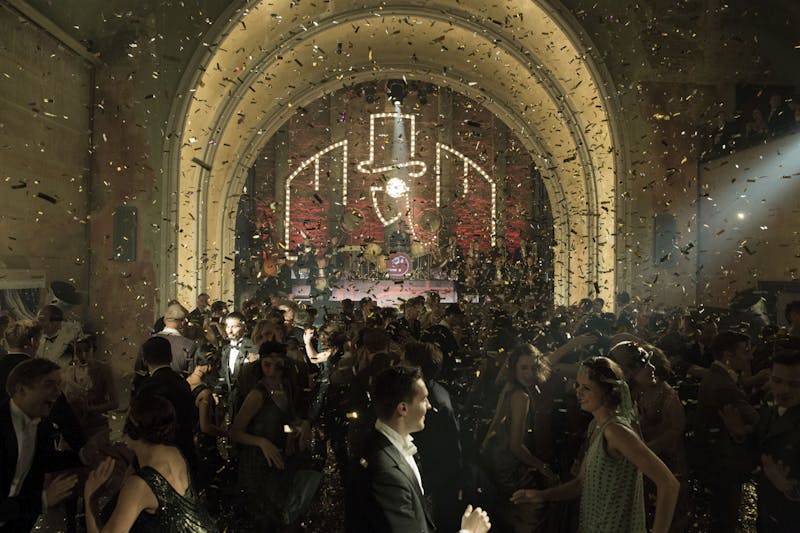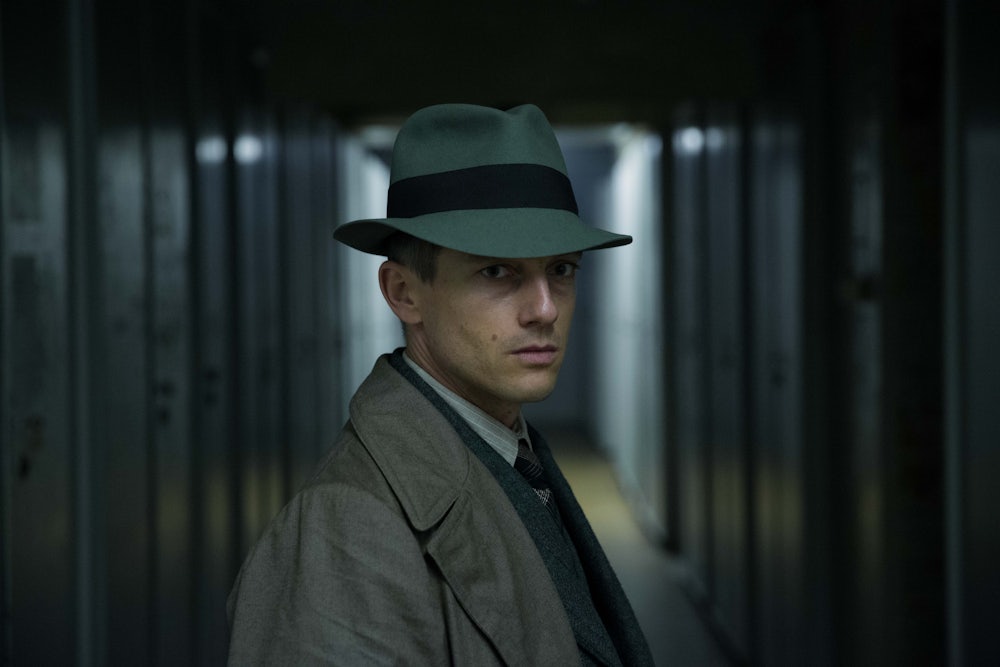The Weimar Republic has long served as a kind of distant mirror in which Germans have both assessed their own progress from the excesses of the Third Reich, and kept a vigilant eye on the dangers of a relapse. It was the one part of twentieth-century history for which Germans could feel something like nostalgia or express something resembling pride. And it appeared to postwar Germans as a moment in which a different future for their country came almost within reach, only to be snatched away. Which is to say, you’ve been to this Berlin many times: It’s the jazzy, dizzy Berlin of Cabaret, of Marlene Dietrich, of “Mack the Knife” drifting across soggy streets.
Rather than a suspiciously eyed outlier among European capitals, Berlin in the Roaring Twenties seemed to summarize its age. The city combined sexual experimentation, ethnic, cultural and sexual diversity, and an almost painful worldliness. The 1920s were also the golden age of German cinema. In fact, the very genre of police procedural has its origin in Weimar Cinema—as do many of the investigative techniques the genre relies on. Babylon Berlin, a new political-tinged detective thriller on Netflix, is eager to conjure up these cultural references. At one point, a detective finds a producer watching Marlene Dietrich’s dailies for The Blue Angel in a building that looks an awful lot like the one in which the child killer Beckert hides in Fritz Lang’s M. The local mafia is directed by a shady psychiatrist figure who recalls another one of Lang’s creation, the thousand-eyed hypnotist Dr. Mabuse.
Set in Berlin in 1929, six months before Black Friday, Babylon Berlin follows police inspector Gereon Rath (Volker Bruch) who has just transferred from Cologne to Berlin, and Charlotte Ritter (Liv Lisa Fries), a young working class woman who is as hardened, pragmatic and unflappable as her city. He nurses a deep sense of inadequacy, a bad case of PTSD and a tendency to self-medicate. She spends her days doing secretarial work and her nights at parties and occasional prostitution in an establishment called Moka Efti. The two have the world’s most uncomfortable meet-cute in a police station men’s room: He’s covered in a suspect’s skull fragments and she helps him to some morphine. Together they investigate a mystery involving a dead man in a canal, a cache of illegal weapons, and a woman who may or may not be a Russian countess.
Weimar Germany is an easy era to mythologize, and Babylon Berlin isn’t coy about getting in on the mythologizing. But it gets the historical details right. Many of the details that may strike viewers as a bit much—the secret German airbase deep in Soviet Russia, say, or the elaborate coup attempts by disgraced generals—were perfectly real, or are riffs on actual events. This show’s Berlin is a place where past and future, East and West, communism and capitalism, politics and sex come together in a convulsive dance. And where the wisest characters are the ones who can shrug off the past, while those who recall it are compelled to repeat it.
In one scene, Rath’s new partner invites him to a dinner honoring members of his platoon left on the field of battle. Everyone in the show has lost something or someone in World War I, so what more natural way to welcome someone into a foreign city than to let them share their grief? But before long, the look back turns creepily foreboding. Men in uniforms gather around an absurd model of the field of their erstwhile battle, while a young boy in a Hitler Youth haircut narrates the events that led to the loss of their comrades. “The German army, undefeated in the field,” they intone—meaning: defeated by politicians in back rooms, sold out by democratic representatives, victims of the infamous “stab in the back.” All of the show’s characters are living with the results of violence, and careening helplessly towards more of it.
As much as Babylon Berlin fits into the long-standing fascination with the Weimar Republic, one gets the feeling it doesn’t hold up the 1920s as contemporary Germany’s distant mirror, but rather as everyone else’s. Babylon Berlin is a self-conscious departure from the kind of history shows German TV cranks out by the dozens every year: Those tend to be drab, self-important, graceless and lacking in nuance. Characters have to be around for all the important stuff you remember from history class. One character will turn out to be a huge Nazi, another will be Jewish, another will be conflicted but weak, another will be a good German, and so on. Babylon Berlin is very careful to signal it’s not that kind of show.
Part of the reason it isn’t: Plodding fare like Generation War is made for a German audience, while Babylon Berlin clearly has an international audience in mind. Rather than being the story Germany tells itself about its own history, the show comes across as the story about its own history that it tells others. Its plotting and characterizations aim to create the layers of ambiguity typical of American prestige TV. It sells you on the Berlin you know from your semester abroad, or that time you backpacked across Europe: Museum Island, Alexanderplatz, Wannsee. A Berlin of yellow subway cars, smoky bars and late night parties. A few of the locations are even actual trendy spots you could find in the latest Lonely Planet guide.
Rather than being framed as particularly German, or as unique to the 1920s, the show’s overriding concerns seem likewise packaged for ease of transfer. There are communists pointing to the violence of “so-called democracy,” and police and politicians who seem hell-bent on proving them right. There is paramilitary violence on the street, and a military unwilling to put up with civilian control. The president is disgusted by the very democracy he is sworn to protect. The social democratic establishment cooks up fake news in smoke-filled backrooms, while communist rabble rousers disseminate their propaganda outside. And big business appears happy to sacrifice democracy if it gives them a bit more control over trade unions—the show’s villainous Alfred Nyssen is fairly obviously Fritz Thyssen, one of Hitler’s largest financial backers for much of the 1920s.

Which is to say, Babylon Berlin is not only concerned with making sense of what Friedrich Meinecke once called “the German catastrophe.” It wants to make broader points about democracy and its institutions, how they survive staggering inequality and a general loss of faith in them. These days Germans are more likely to ask raise such points about other countries than about their own. German anxiety over the Nazi past has long been an export item—filmmakers, authors, artists submitted German history to earnest examination, and had an easier time reaching international audiences and winning awards when they did. But with illiberal democracy on the rise throughout Europe, with a U.S. president seemingly at war with the rule of law, Angela Merkel’s Germany finds itself as an unexpected island of liberal democracy in far more uncertain waters. Babylon Berlin is less anxious self-examination than knowing warning to others.
In one of many darkly funny scenes in Babylon Berlin, fancy rowboats jet past on a Berlin lake. Two young men in their swimsuits watch the hooting crews from the public beach next door. “Mass executions are a legitimate means of revolution,” one remarks. “Who says? Hitler?” the other asks. “Lenin,” his friend replies. If Babylon Berlin has a thesis statement that might be it: It wants to tell the story of democracy undone by totalitarianism from the left and the right. Whether you buy that, or whether, especially given the fate of Germany’s communists after 1933, this strikes you as the kind of cheap “both sides” equivocation, may influence whether you take Babylon Berlin portrait of the Weimar Republic seriously. But take comfort: Even if you don’t, you’re still left with Eton crops and swing tracks, with drug-fueled nights and Mack the Knife.
